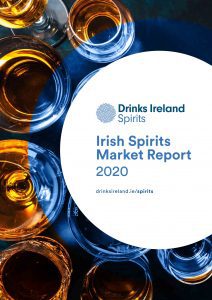Spirits – a predictably poor 2020

Some spirits categories appear to have benefitted from the switch to off-trade purchasing in Ireland according to the report.
Whilst the on-trade remained responsible for a surprisingly unchanging 64.7% of spirits sales by value (or €542 million), the off-trade enjoyed 88% of the volume last year at 1.8 million cases to the on-trade’s figure of 247,392 cases, giving the on-trade just 12% of the spirits market.
The previous year, 2019, the on-trade had a far higher volume share at 31.8%.
But the uniqueness of last year is also reflected in value shares.
Last year’s €542 million on-trade spirits value is also down on 2019’s value figure of €658 million whilst at 247,392 cases, on-trade volumes were understandably down on 2019’s 569,643 case figure. This is of concern. Pubs, restaurants and hotels here form a vital component in the continuing growth and prosperity of Ireland’s spirits and craft spirits business states the report.
They’ve proved a reliable testing ground for so many innovations and product launches.

Some spirits categories benefited from the consumer shift to the off-trade in Ireland, according to the report.
Spirits diversification
As the pandemic closed down the on-trade, spirits distribution companies and distilleries reacted by increasing their emphasis on the off-trade and developing a more intense focus on e-commerce as a marketing and sales avenue for marketing their brands.
“The emergence of e-commerce as a sales channel establishing direct relationships with the consumer was a notable positive development that has emerged out of the Covid-19 pandemic,” observes the report.
As a category spirits were responsible for 22.3% of Ireland’s alcohol consumption, actually growing share in 2020 by 6.73% and continuing a pattern of share growth that began in 2015.
Consumption
Apart from the collapse of on-trade consumption in 2020, Global Travel Retail – a market that spirits companies target and sell into – also collapsed for obvious reasons.
Prior to Covid-19, GTR was the second-largest market for Irish whiskey and the fourth-largest for Irish Cream Liqueur. Recovery in this market could be slow, according to the report and is likely to go hand-in-hand with international travel returning to pre-pandemic levels.
While sales of vodka declined by 10.2% last year it remained Ireland’s most popular spirits drink with a 31.6% market share in the spirits category. This was followed by Irish whiskey (26.3%), gin/Irish gin (14.04%) and rum (7.4%).
Although sales of gin in Ireland fell by 6.6% between 2019 and 2020, it has witnessed remarkable growth in recent years, with gin sales up 184% between 2014 and 2019.
Forecasts for the next five-year period suggest that the growth in gin/Irish gin has not ended, states Drinks Ireland|Spirits – and that the decline in 2020 will be seen as a Covid-19-related blip.
“For both Irish Whiskey (second) and Irish Cream (fourth) GTR was one of their largest retail markets,” states the Head of Drinks Ireland|Spirits and the report’s author Vincent McGovern, who also points out in the report that the gin and Irish gin category registered its first decline in growth since the so-called ‘boom’ started picking up speed in 2015.
“Much of the small decline in 2020 can be placed at the door of Covid and the restrictions in place in the on-trade, a key consumer channel for gin during the year,” he stated.
“Gin has seen a fall of 15% in sales of Irish gins compared to a fall of 2.9% for imported brands,” notes the report, “A similar fall is reflected in the vodka category with a fall of 12.8% for Irish-produced vodka compared to that of 3.1% for imported brands.”
On the other hand, some spirits categories appear to have benefitted from the switch to off-trade purchasing in Ireland according to the report, with Irish Cream Liqueur sales estimated to have grown by 26.5% to 113,100 cases from 89,400 cases the previous year.
“Irish Cream liqueur (up 26.5%) and Scotch whisky (up 9.9%) have benefitted from the uplift in sales in the off-trade,” states Vincent McGovern, “Vodka (down 10.2%) and Tequila (down 30.4%) are notably down which suggests more of a dependency on the on-trade than others might have.”
And Ready To Drink products had a good year too such as spirits-based RTDs and Hard Seltzers enjoyed a good 2020 too.
“In 2020 nearly 90,000 cases of various brands were sold, primarily in the off-trade. Other spirits-based RTDs have also seen significant uplift in terms of sales and brands on sale in the past year suggesting for some the disruption caused by Covid has been an opportunity.”
As a category Hard Seltzers didn’t exist in Ireland in 2019, but in 2020 nearly 90,000 cases of various brands were sold.
The off-trade was responsible for the lion’s share or 88.6% of these sales while locally-produced Hard Seltzer brands accounted for just 21.9% of all Seltzers sold here.
Overall, average consumption of alcohol per adult declined in 2020 with total consumption decreasing by 5.1% while at the same time the adult population increased in size by 1.6%.
Exports
Of course the global pandemic hit Irish spirits exports. These fell 15.97% in value to €990.6 million from nearly €1.2 billion in 2019. However, this comes on the back of a number of years of strong growth, with the value of spirits exports rising 83.6% between 2014 and 2019, prior to Covid-19.
“Travel restrictions put in place across the globe because of the Covid-19 crisis have severely restricted this market and contributed to the decline in exports,” notes the report.
Global sales of Irish whiskey were down 4.02% to 11.4 million cases.
The US remained Irish whiskey’s top export market although volume was down 1.7% to 4.93 million cases last year from 5 million cases in 2019.
Domestic sales became the second-most important market for Irish whiskey during Lockdown with sales of 591,000 cases in 2020, slightly up on the figure for 2019. Russia took third place in the export stakes on 534,300 cases, well down on 2019’s 605,800 case figure. In fourth place the UK grew sales to 531,000 cases, up from 467,800 in 2019.
Irish Cream Liqueur’s export volume sales fell 2.8% to 8.27 million cases from 8.51 million cases with the US being the top export market followed by the UK and Canada. Ireland consumed an estimated 113,100 cases last year.
Excise tax
Ireland continues to be dogged by the second-highest excise tax on alcohol in Europe as well as the third-highest rate of excise in Europe on spirits (after Finland and Sweden).
Some €374.3 million was collected in excise tax in 2020, slightly up on the 2019 figure of €373.4 million.
Covid-19 also negatively affected Irish distilleries that host visitor experiences and the return of inbound tourism will be critical in driving recovery here.
“Irish hospitality venues are a vital component to the continued growth and prosperity of Ireland’s spirits and craft spirits sector, allowing companies to engage with consumers, so their closure was very much felt,” confirmed Drinks Ireland|Spirits’ Chair Bryan Fallon (who’s also the Managing Director of Heaven Hill Ireland, brand-owner of Carolan’s Irish Cream Liqueur and Irish Mist Honey Liqueur), “Despite this, the resilience shown by the spirits sector last year in the face of the loss of one of the main consumer channels was remarkable, with producers responding with an increased emphasis on the off-trade and a focus on e-commerce.
“Outside of Covid-19, a number of other challenges remain such as Ireland’s high level of tax on alcohol which is unsustainable and uncompetitive,” he continued, “An excise reduction would boost post-Covid tourism and secure sustainable, long-term growth for Ireland’s drinks and hospitality businesses in 2022 and beyond.
“While 2020 has shown that our sector is resilient and adaptable, this resilience and adaptability will be tested in the post-Covid world and Government must support in our sector’s recovery through an excise cut.”
Alas it was not to be…. This year.









